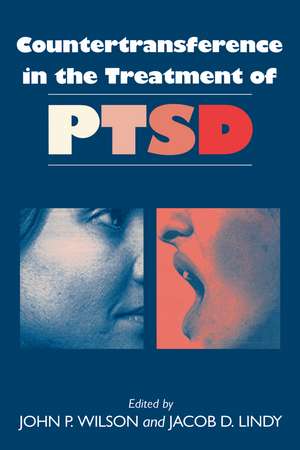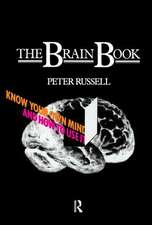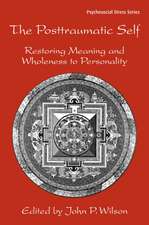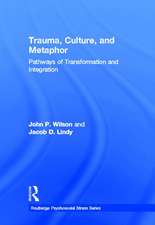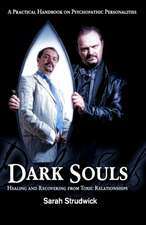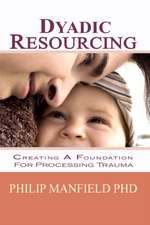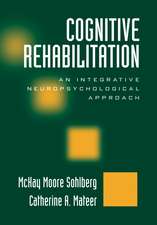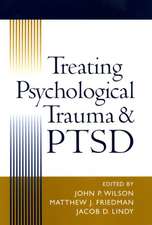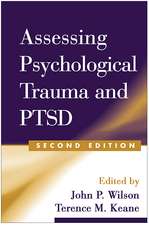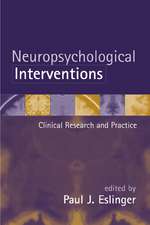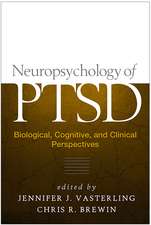Countertransference in the Treatment of PTSD
Editat de John P. Wilson, Jacob D. Lindyen Limba Engleză Hardback – 28 apr 1994
It is now widely recognized that mental health professionals who work with trauma victims are themselves at risk for powerful countertransference reactions (CTRs), vicarious victimization, and stress-related burnout. This volume is the first book in the field of traumatic stress studies to systematically examine the unique role of countertransference processes in psychotherapy outcome. Emphasizing the need for carefully deliberated action, this volume offers vital new insights into the victim-healer relationship and presents detailed techniques to promote awareness of affective reactions for anyone working with sufferers of PTSD and its comorbid conditions such as anxiety, depression, and substance abuse.
Part I introduces readers to theoretical and conceptual foundations of countertransference in post-traumatic therapies. Illustrated with case examples, the relationship of empathic strain to countertransference and two types of therapist defenses are examined. Chapters in Part II discuss countertransference issues that arise in the treatment of victims of sexual, physical, and emotional abuse, including survivors of rape and early childhood trauma; children traumatized by urban violence; patients with multiple personality disorder; and acutely traumatized children.
Part III examines therapists' reactions in work with victims of war trauma, civil violence, and political oppression, as well as other groups whose trauma must be understood in specific cultural and historical context. Explicit examples of avoidant and overidentification responses are presented. Finally, Part IV expands the discussion of trauma and countertransference to survivors of both direct and indirect trauma, such as that of rescue workers who, during natural disasters, are exposed to the threat of the disaster and the plight of those they attempt to help. Throughout, case vignettes illustrate the signs and symptoms of trauma-specific CTRs as they unfold during treatment. The roles through which clinicians can successfully engage survivors are also detailed.
Rich with explicit suggestions for providing compassionate and intelligent care, this insightful volume is ideal for psychotherapists, psychologists, and other mental health professionals working with people suffering from PTSD. Similarly, Countertransference in the Treatment of PTSD is a valuable classroom text for courses dealing with the treatment of trauma victims and its implications for psychotherapists.
Part I introduces readers to theoretical and conceptual foundations of countertransference in post-traumatic therapies. Illustrated with case examples, the relationship of empathic strain to countertransference and two types of therapist defenses are examined. Chapters in Part II discuss countertransference issues that arise in the treatment of victims of sexual, physical, and emotional abuse, including survivors of rape and early childhood trauma; children traumatized by urban violence; patients with multiple personality disorder; and acutely traumatized children.
Part III examines therapists' reactions in work with victims of war trauma, civil violence, and political oppression, as well as other groups whose trauma must be understood in specific cultural and historical context. Explicit examples of avoidant and overidentification responses are presented. Finally, Part IV expands the discussion of trauma and countertransference to survivors of both direct and indirect trauma, such as that of rescue workers who, during natural disasters, are exposed to the threat of the disaster and the plight of those they attempt to help. Throughout, case vignettes illustrate the signs and symptoms of trauma-specific CTRs as they unfold during treatment. The roles through which clinicians can successfully engage survivors are also detailed.
Rich with explicit suggestions for providing compassionate and intelligent care, this insightful volume is ideal for psychotherapists, psychologists, and other mental health professionals working with people suffering from PTSD. Similarly, Countertransference in the Treatment of PTSD is a valuable classroom text for courses dealing with the treatment of trauma victims and its implications for psychotherapists.
Preț: 444.27 lei
Preț vechi: 467.65 lei
-5% Nou
Puncte Express: 666
Preț estimativ în valută:
85.02€ • 88.44$ • 70.19£
85.02€ • 88.44$ • 70.19£
Carte tipărită la comandă
Livrare economică 14-28 aprilie
Preluare comenzi: 021 569.72.76
Specificații
ISBN-13: 9780898623697
ISBN-10: 0898623693
Pagini: 406
Dimensiuni: 152 x 229 x 35 mm
Greutate: 0.82 kg
Ediția:New.
Editura: Guilford Publications
Colecția Guilford Press
ISBN-10: 0898623693
Pagini: 406
Dimensiuni: 152 x 229 x 35 mm
Greutate: 0.82 kg
Ediția:New.
Editura: Guilford Publications
Colecția Guilford Press
Public țintă
Postgraduate, Professional, Professional Practice & Development, and UndergraduateCuprins
I. Theoretical and Conceptual Foundations of Countertransference in Post-Traumatic Therapies
1. Empathic Strain and Countertransference, John P. Wilson and Jacob D. Lindy
2. Empathic Strain and Therapist Defense: Type I and II CTRs, John P. Wilson, Jacob D. Lindy, and Beverley Raphael
3. Empathic Strain and Countertransference Roles: Case Illustrations, Jacob D. Lindy and John P. Wilson
II. Countertransference in the Treatment of Victims of Sexual, Physical, and Emotional Abuse
4. The Dance of Empathy: A Hermeneutic Formulation of Countertransference, Empathy, and Understanding in the Treatment of Individuals Who Have Experienced Early Childhood Trauma, I. Lisa McCann and Joseph Colletti
5. Countertransference in the Treatment of Multiple Personality Disorder, Richard P. Kluft
6. Inner City Children of Trauma: Urban Violence Traumatic Stress Response Syndrome (U-VTS) and Therapists' Responses, Erwin Randolph Parson
7. Countertransference in the Treatment of Acutely Traumatized Children, Kathleen Nader
8. Rape and the Phenomena of Countertransference, Carol R. Hartman and Helene Jackson
III. Countertransference Reactions in Work with Victims of War Trauma, Civil Violence, and Political Oppression
9. Countertransference in the Treatment of Southeast Asian Refugees, J. David Kinzie
10. Determinant Factors for Countertransference Reactions under State Terrorism, Inger Agger and Soren Buus Jensen
11. Countertransference in the Treatment of War Veterans, Michael J. Maxwell and Cynthia Sturm
12. Countertransference and World War II Resistance Fighters: Issues in Diagnosis and Assessment, Wybrand Op den Velde, G. Frank Koerselman, and Petra G. H. Aarts
IV. Countertransference in "At-Risk" Professionals: Rescue Workers, Mental Health Providers, and Persons at the Workplace
13. When Disaster Strikes: Managing Emotional Reactions in Rescue Workers, Beverley Raphael and John P. Wilson
14. Trauma and Countertransference in the Workplace, Christine Dunning
15. Countertransference, Trauma, and Training, Yael Danieli
16. Beyond Empathy: New Directions for the Future, Jacob D. Lindy and John P. Wilson
Index
1. Empathic Strain and Countertransference, John P. Wilson and Jacob D. Lindy
2. Empathic Strain and Therapist Defense: Type I and II CTRs, John P. Wilson, Jacob D. Lindy, and Beverley Raphael
3. Empathic Strain and Countertransference Roles: Case Illustrations, Jacob D. Lindy and John P. Wilson
II. Countertransference in the Treatment of Victims of Sexual, Physical, and Emotional Abuse
4. The Dance of Empathy: A Hermeneutic Formulation of Countertransference, Empathy, and Understanding in the Treatment of Individuals Who Have Experienced Early Childhood Trauma, I. Lisa McCann and Joseph Colletti
5. Countertransference in the Treatment of Multiple Personality Disorder, Richard P. Kluft
6. Inner City Children of Trauma: Urban Violence Traumatic Stress Response Syndrome (U-VTS) and Therapists' Responses, Erwin Randolph Parson
7. Countertransference in the Treatment of Acutely Traumatized Children, Kathleen Nader
8. Rape and the Phenomena of Countertransference, Carol R. Hartman and Helene Jackson
III. Countertransference Reactions in Work with Victims of War Trauma, Civil Violence, and Political Oppression
9. Countertransference in the Treatment of Southeast Asian Refugees, J. David Kinzie
10. Determinant Factors for Countertransference Reactions under State Terrorism, Inger Agger and Soren Buus Jensen
11. Countertransference in the Treatment of War Veterans, Michael J. Maxwell and Cynthia Sturm
12. Countertransference and World War II Resistance Fighters: Issues in Diagnosis and Assessment, Wybrand Op den Velde, G. Frank Koerselman, and Petra G. H. Aarts
IV. Countertransference in "At-Risk" Professionals: Rescue Workers, Mental Health Providers, and Persons at the Workplace
13. When Disaster Strikes: Managing Emotional Reactions in Rescue Workers, Beverley Raphael and John P. Wilson
14. Trauma and Countertransference in the Workplace, Christine Dunning
15. Countertransference, Trauma, and Training, Yael Danieli
16. Beyond Empathy: New Directions for the Future, Jacob D. Lindy and John P. Wilson
Index
Notă biografică
John P. Wilson, PhD, is Professor of Psychology at Cleveland State University and widely recognized international expert in PTSD. He was a cofounder and past-president of the International Society for Traumatic Stress Studies. Dr. Wilson is the author of Trauma, Transformation, and Healing, and coeditor, with Beverley Raphael, of The International Handbook of Traumatic Stress Syndromes. At present, he is Director for Stress and Trauma in Cleveland, Ohio, and Chairperson of Emergency and Disaster Services for The American Red Cross.
Jacob D. Lindy, M.D., has worked as a clinician, researcher, and consultant in the area of trauma studies for over 20 years. A training and supervising analyst at the Center for Psychoanalysis in Cincinnati, Ohio, he is Director of the University of Cincinnati Traumatic Stress Study Center, and past president of both the International Society for Traumatic Stress Study Center and the International Society for Traumatic Stress Studies. He is also the first recipient of the Sarah Haley Award for clinical excellence in trauma therapy.
Jacob D. Lindy, M.D., has worked as a clinician, researcher, and consultant in the area of trauma studies for over 20 years. A training and supervising analyst at the Center for Psychoanalysis in Cincinnati, Ohio, he is Director of the University of Cincinnati Traumatic Stress Study Center, and past president of both the International Society for Traumatic Stress Study Center and the International Society for Traumatic Stress Studies. He is also the first recipient of the Sarah Haley Award for clinical excellence in trauma therapy.
Recenzii
Containing insights into the treatment process for therapists of all theoretical persuasions, Countertransference in the Treatment of PTSD is bound to be the definitive work on this topic for a generation of therapists. Filled with theoretical models and clinical case descriptions, this book is at once useful for the most experienced and senior therapist while being indispensable for the novice. This assemblage of therapists and clinicians have shared with us their collective wisdom from literally centuries worth of clinical experience. We are indebted to them for this gift. --Terence M. Keane, Ph.D., Director, National Center for PTSD-Boston; Chief, Psychology Service, Boston VA Medical Center; Tufts University School of Medicine
Questions of countertransference are nowhere more painful, or more important, than in work with victims of extreme trauma. Wilson and Lindy bring their own vast experience in this area, as well as that of a number of accomplished colleagues, to produce a volume of extraordinary value. The writing throughout combines rigor and compassion. Therapist and students of trauma in general will find in this book models for sensitive clinical practice informed by skillfully woven theory. --Robert Jay Lifton, M.D., Author of The Protean Self, The Nazi Doctors, and The Broken Connection
Every therapist who treats the survivor of trauma, every clinician who encounters cruelty, every scholar who studies stress syndromes will value this volume from Wilson and Lindy. Here are assembled the personal revelations, the organizing concepts, the dilemmas and insights of experts--the world leaders of the modern age of traumatic stress studies. They ask us to examine ourselves as we engage in the healing process and they make the self-scrutiny interesting. --Frank M. Ochberg, M.D., Adjunct Professor, Psychiatry, Criminal Justice; Journalism, Michigan State University
Particularly useful for gaining an appreciation of the unique stresses on the professional's empathic relationship with traumatized individuals. The book could easily serve as a text for teaching students and as a stimulus for ongoing case supervision and peer group discussion.... There is not a chapter here that I did not learn something from. I would highly recommend it to those doing psychotherapy or working in any other way with traumatized individuals. --Linda Gay Peterson, M.D.
-Questions of countertransference are nowhere more painful, or more important, than in work with victims of extreme trauma. Wilson and Lindy bring their own vast experience in this area, as well as that of a number of accomplished colleagues, to produce a volume of extraordinary value. The writing throughout combines rigor and compassion. Therapist and students of trauma in general will find in this book models for sensitive clinical practice informed by skillfully woven theory. --Robert Jay Lifton, M.D., Author of The Protean Self, The Nazi Doctors, and The Broken Connection
Every therapist who treats the survivor of trauma, every clinician who encounters cruelty, every scholar who studies stress syndromes will value this volume from Wilson and Lindy. Here are assembled the personal revelations, the organizing concepts, the dilemmas and insights of experts--the world leaders of the modern age of traumatic stress studies. They ask us to examine ourselves as we engage in the healing process and they make the self-scrutiny interesting. --Frank M. Ochberg, M.D., Adjunct Professor, Psychiatry, Criminal Justice; Journalism, Michigan State University
Particularly useful for gaining an appreciation of the unique stresses on the professional's empathic relationship with traumatized individuals. The book could easily serve as a text for teaching students and as a stimulus for ongoing case supervision and peer group discussion.... There is not a chapter here that I did not learn something from. I would highly recommend it to those doing psychotherapy or working in any other way with traumatized individuals. --Linda Gay Peterson, M.D.
Could easily serve as a text for teaching students and as a stimulus for ongoing case supervision and peer group discussion.... There is not a single chapter here that I did not learn something from....I would highly recommend it to those doing psychotherapy or working in any other way with traumatized individuals.
--Psychiatric Services, 3/12/1994ƒƒNo one working in the field of disaster, regardless of theoretical affiliation, should let Countertransference in the Treatment of PTSD pass by unread.
--Contemporary Psychology, 3/12/1994ƒƒIn this fascinating volume, many different authorities in the field present in-depth analyses of what we ordinarily describe as countertransference reactions, but they also explore unusual and extraordinary facets of countertransference reactions to post-traumatic stress disorder (PTSD). I would recommend this book to all therapists, but it should be required reading for any therapist who deals extensively with PTSD.
--Journal of Psychotherapy Practice and Research, 3/12/1994Descriere
This volume is the first book in the field of traumatic stress studies to systematically examine the unique role of countertransference processes in psychotherapy outcome.
